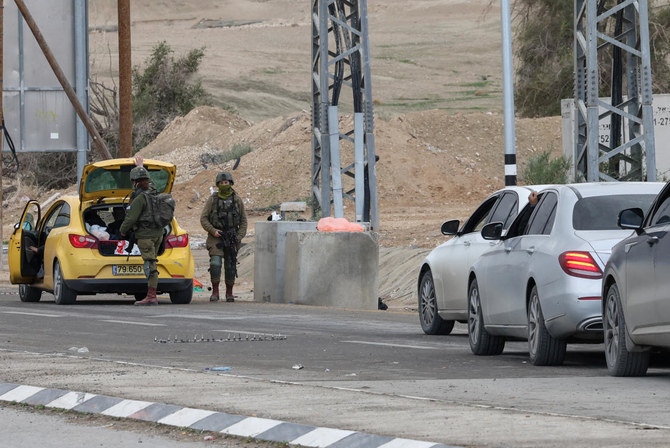RAMALLAH: Israeli forces assassinated five Palestinians during a raid on a refugee camp near the occupied West Bank city of Jericho on Monday, according to Palestinian officials.
The office of President Mahmoud Abbas described the killings as a crime, and urged the US to put pressure on Israeli authorities to restrict incursions by their forces.
“The new Israeli government is continuing its series of crimes against our Palestinian people,” it said.
Israeli forces also injured three people, one of them seriously, and arrested eight in the early-morning raid, the Palestinian sources said.
Jihad Abu Al-Assal, the governor of Jericho and the Jordan Valley, said the military had so far refused to release the bodies of the dead.
The violence on Monday came days after an Israeli military raid on the Jenin refugee camp during which 10 Palestinians were killed. Most were militants but a 61-year-old woman was also among the dead.
In Monday’s raid, a large number of troops stormed the Aqbat Jaber camp at dawn. The five people killed in the confrontations that followed were named as: Raafat Wael Awadat, 21; Malik Awni Lafi, 22; Adham Majdi Awadat, 22; Ibrahim Wael Awaidat, 27 and Thaer Awadat, 28.
The Israeli army alleged that all of the dead were affiliated with Hamas. It released photos of rifles seized during the raid, which had the name of the military wing of Hamas written on them.
Israeli forces continued their siege of the city of Jericho and the Aqabat Jaber camp for a 10th day in a row on Monday. Main and secondary entrances to the city remained blocked by military checkpoints, restricting the movement of vehicles.
The killing of the five Palestinians sparked anger across the West Bank. Strikes took place in Jericho, Ramallah, and some other cities to mourn the dead. A protest march took place in the center of Ramallah, accompanied by chants condemning the Israeli occupation.
Palestinian Prime Minister Mohammed Shtayyeh called on the UN to protect “our people and not to allow the perpetrators to escape punishment.”
He added: “With a sense of the ability to escape punishment, and motivated by the desire to practice killing according to a doctrine that shapes the thought and behavior of the perpetrators, the occupation soldiers continue to commit massacres against our defenseless people, in a scene that brings to mind the heinous crimes committed by the Zionist gangs against our people in cities and villages.”
The General Secretariat of the Organization of Islamic Cooperation condemned the killings, the siege on Jericho, injuries inflicted on Palestinian citizens, premeditated killings, the continuing Israeli settlements policy, the demolition of Palestinian homes in East Jerusalem, and the displacement of its residents.
The organization called on the international community to urgently intervene to help put an end to the attacks and daily crimes against Palestinians. It stressed the need to hold the perpetrators accountable and for the world to provide protection for the Palestinian people.
The Israel Defense Forces were put on alert following the killings in Jericho amid fears that Hamas would respond by firing rockets from Gaza at Israeli targets.
Israeli National Security Minister Itamar Ben-Gvir warned Hamas not to launch any rockets from the Gaza Strip in retaliation. He said the response to any such aggression should be integrated and that for every missile fired from Gaza “we must respond with 50 missiles.”
He added: “This is my vision and I hope the government will implement it. I am optimistic and believe that this will happen.”
Palestinian political analyst Ghassan Al-Khatib told Arab News that he would expect any response by Hamas or its supporters to the killings in Jericho to originate in the West Bank and not the Gaza Strip.
“There is a great exaggeration and harshness in the Israeli oppression against the Palestinians, more than ever before, which will bring violent reactions against the Israeli occupation,” he added.
He said that the killing and abuse of Palestinians by Israeli authorities weakens the status and prestige of the Palestinian Authority.
In a joint statement, the Israeli military and the internal security service Shin Bet said that they had conducted counterterrorism activity in the Aqabat Jabr Camp to apprehend a Hamas terrorist squad responsible for shooting at a restaurant in the community of Vered Yeriho on Jan. 28. It added that several armed assailants had been killed after they fired at IDF soldiers.
The Fatah movement said that what it described as the bloody massacre committed by the Israeli army during its aggression against the Aqabat Jaber camp reflected the fascist ideology of successive occupation governments.
“The neo-fascist government, which is trying, through this systematic terrorism, to export its internal crises and to practice the most brutal methods of bloody terror against the Palestinians through the policies of killing, execution, abuse, arrest and incursions into the Palestinian lands,” it added.
Fatah said attempts by the occupation to erase the Palestinian existence were doomed to failure. It also condemned the international silence about the Israeli actions and what it described as the US bias in favor of the occupation and its terrorist regime, which its said provides the occupation and its army with a guarantee that it can commit massacres and other crimes without being held accountable.
Hamas vowed to respond to the killing of five of its members. It said it would not tolerate the spilling of Palestinian blood by Israeli army bullets, and that it was ready to respond to the occupation with full force.
Ismail Haniyeh, head of the political bureau of Hamas, said its battalions will continue their operations “until the occupation is defeated.”
















